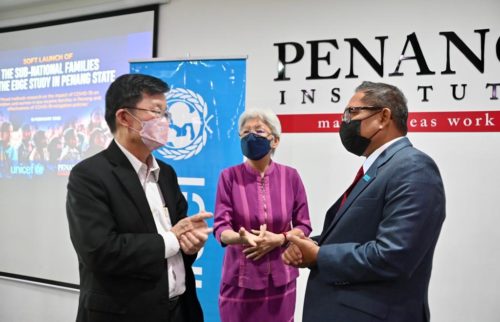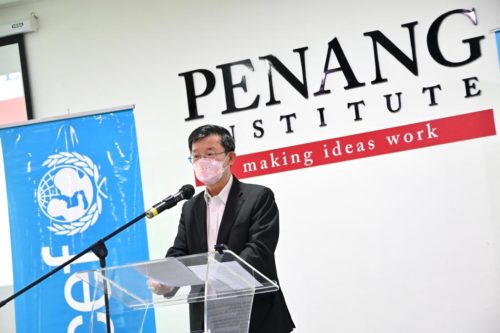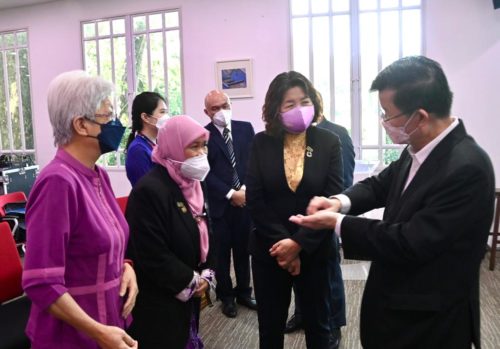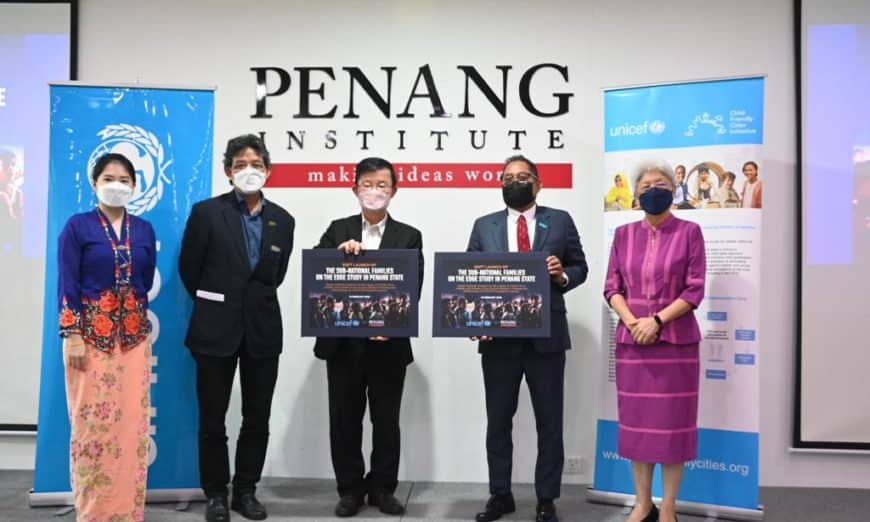THE Penang Institute will be launching a thorough study called ‘The Sub-National Families on the Edge Study in Penang State’ to assess the effectiveness of various forms of aid that were extended to women and children from low-income households during the Covid-19 pandemic.
Supported by the Penang government and the United Nations International Children’s Emergency Fund (UNICEF) Malaysia, the study is expected to take place from March to July this year.
It is learnt that some 600 households in Penang and five Civil Society Organisations across all the five districts in the state have been invited to participate in the study.
Chief Minister Chow Kon Yeow happily acknowledged Penang Institute and UNICEF for embarking on a mixed methods research project to assess the impact of Covid-19 on children and women from low-income families, as well as to measure the effectiveness of the state’s Covid-19 mitigation policies.
“I understand that the project will focus on the overall socioeconomic impact of Covid-19, and the detrimental results of the lockdowns on women and children from low-income households in the state.
“Most interestingly, the study will evaluate the efficacy of the mitigation policies from the perspective of those people who are most affected by the pandemic.
“I wish to thank Penang Institute and UNICEF Malaysia for undertaking the important task of carrying out this much-needed research project to better understand our community during this challenging period,” Chow said during the soft launch of the study at Penang Institute in George Town today.

Chow said that the state recognises families as the building blocks of societies, and that they must always be protected, especially in these unprecedented times.
“The vulnerabilities of women and children, in particular, must be addressed and remedied,” he added.
Over the past two years, Chow mentioned that the state has introduced various initiatives to help lift the burdens of affected families. One of which was allocating a total of RM174.52 million through three phases of an aid programme.
“Apart from cash assistance, the state government has also consistently provided care packages such as the Mutiara Foodbank, and other necessities to vulnerable families and communities,” Chow said.
Meanwhile, Penang Institute senior analyst Beh May Ting said the study would be divided into three parts, namely telephone surveys, focus group discussions, and photography projects.

“Apart from reaching out to the affected families, the focus group discussions will see the participation of community leaders, non-governmental organisation (NGO) members and government officers.
“This is going to be an exciting journey for all of us.
“We are truly grateful to be given the opportunity to conduct this research project, which at the end of the day, is going to help us to better understand the impact of the crisis on the people of Penang, particularly on women and children,” Beh said.
Penang Institute executive director Datuk Dr Ooi Kee Beng said that the research project was not just a reminder of the hard times weathered through by the vulnerable groups, but an initiative to understand how they have suffered and survived.
“It is also to understand the effectiveness of the aid provided to alleviate their burden.
“Penang Institute has done all it can to assist the state and the relevant stakeholders to help affected households over these two years.
“For instance, we have done thorough studies on the global income households, issue of domestic violence, child sexual abuse, immigrant workers, and elderly care.
“We are excited to be chosen by UNICEF to work on this latest effort, and we are ready to assist the state to develop faster and effective measures in the long term for affected households,” Ooi added.
UNICEF representative to Malaysia and special representative to Brunei Darussalam Dr Rashed Mustafa Sarwar said that UNICEF was looking forward to the research project.

“Thank you Penang for promoting social justice among the vulnerable groups. The presence of the Chief Minister here speaks a lot about the state’s concern for its people.
“As for Malaysia and UNICEF, we shared 57 years of social development ties, and our efforts in the past go beyond Covid and other emergencies.
“We hope to maintain this relationship, and with states like Penang pioneering in areas so important, it is definitely possible,” Rashed said.
Separately, he said that under the new Country Development Programme for 2022-2025, UNICEF would focus more on the roles played by the states in promoting children’s rights and well-being.
“Sub-national governments are in a unique position to develop policies that respond to local challenges and opportunities, adapt to changing contexts and, therefore, deliver adequate, timely and relevant support to vulnerable children and families.
“Such support should be considered as an investment in Penang’s future,” he added.
Also present was state Social Development and Non-Islamic Religious Affairs Committee chairman Chong Eng.
Story by Kevin Vimal
Pix by Alissala Thian
Video by Law Suun Ting

